Summary:
The Wars of the Three Kingdoms were a series of interconnected conflicts that took place in the British Isles between 1639 and 1651. These wars were primarily fought between the English Parliamentarians, led by Oliver Cromwell, and the Royalists, who supported King Charles I. The conflicts involved England, Scotland, and Ireland, and had profound political, religious, and social consequences for all three kingdoms.
The Bishops’ Wars:
The Wars of the Three Kingdoms began with the Bishops’ Wars, which were fought between 1639 and 1640. These wars were sparked by Charles I’s attempts to impose Anglican religious practices on Scotland, which was predominantly Presbyterian. The Scottish Covenanters, led by Alexander Leslie, successfully resisted these attempts, leading to a stalemate and the signing of the Treaty of Berwick in 1639. However, tensions remained, and a second Bishops’ War broke out in 1640, resulting in the Scottish occupation of northern England.
The English Civil War:
The English Civil War, which lasted from 1642 to 1651, was the central conflict of the Wars of the Three Kingdoms. It was fought between the Royalists, who supported the king, and the Parliamentarians, who sought to limit the king’s power. The war can be divided into three phases: the First Civil War (1642-1646), the Second Civil War (1648-1649), and the Third Civil War (1650-1651).
The First Civil War saw initial Royalist successes, but the Parliamentarians, under the leadership of Oliver Cromwell, gradually gained the upper hand. The decisive Battle of Naseby in 1645 resulted in a Parliamentarian victory and marked a turning point in the war. Charles I surrendered to the Scottish Covenanters in 1646, but his subsequent escape and alliance with Irish Catholics led to the outbreak of the Second Civil War.
The Second Civil War was shorter and more brutal than the first. The Parliamentarians swiftly defeated the Royalists, and in 1649, Charles I was put on trial and executed. The monarchy was abolished, and England was declared a republic, known as the Commonwealth of England.
The Third Civil War, also known as the Cromwellian Conquest of Ireland, took place from 1649 to 1651. Cromwell’s forces invaded Ireland, where the Royalists and Irish Catholics had formed an alliance against the Parliamentarians. The war resulted in a devastating defeat for the Irish and marked the beginning of English domination over Ireland.
The Scottish Wars:
While the English Civil War was raging, Scotland experienced its own internal conflicts. The Scottish Covenanters initially supported the Parliamentarians, but tensions arose when the English Commonwealth attempted to impose its authority on Scotland. The Scottish Wars, also known as the Wars of the Three Kingdoms in Scotland, lasted from 1644 to 1651.
The Scottish Royalists, led by James Graham, Marquess of Montrose, fought against the Covenanters and the English Commonwealth. Montrose achieved several victories, but ultimately, the Covenanters and the Parliamentarians prevailed. Scotland was incorporated into the Commonwealth in 1651, and the Scottish monarchy was abolished.
Consequences:
The Wars of the Three Kingdoms had far-reaching consequences for all three nations involved. In England, the monarchy was temporarily abolished, and the Commonwealth of England was established. The wars also led to significant social and religious changes, with the rise of radical religious groups and the questioning of traditional authority.
In Scotland, the wars resulted in the establishment of a Presbyterian Church and the end of the Scottish monarchy. The conflicts also deepened divisions between Highland and Lowland Scotland, as well as between different religious factions.
In Ireland, the wars had devastating consequences. The Cromwellian Conquest led to the massacre and displacement of thousands of Irish Catholics, and English Protestant settlers were brought in to replace them. The wars exacerbated existing tensions between Catholics and Protestants and had a lasting impact on Irish history.
Overall, the Wars of the Three Kingdoms were a complex and interconnected series of conflicts that reshaped the political, religious, and social landscape of England, Scotland, and Ireland. The legacy of these wars continues to be felt to this day.












